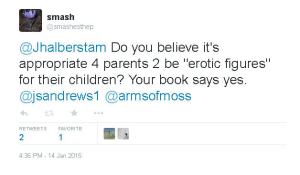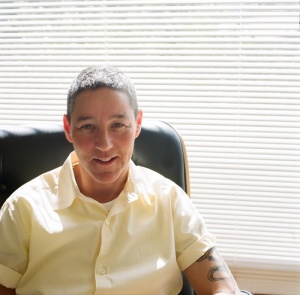gaga feminism
January 14, 2015 12 Comments
I’ve recently had the misfortune of reading a particularly bad post-modernist book entitled Gaga Feminism. The author is Judith Jack Halberstam who can be reached on twitter at @Jhalberstam.
Halberstam comes from a queer theory background and uses this framework throughout the book. Within the first few pages Susan Faludi, author of the insightful book Backlash, is bashed for not incorporating the latest female-erasing queer theory analyses into her projects.
Within the first fifteen pages, however, we see an incredibly worrying passage. Halberstam recommends civil libertarian Judith Levine’s (twitter here) “brave and controversial” book Harmful to Minors: The Perils of Protecting Children From Sex. From wikipedia:
[Levine] suggests liberalization of age-of-consent laws in the United States and the conception of minors as sexual beings, which Levine argues is extant in Western Europe. Levine argues for weakening most United States laws governing possession of child pornography, the access of abortions to minors, and conduct classified as statutory rape. Conservative commentators have heavily criticized her work.
This content is pretty concerning to me as a feminist who is opposed to the sexual exploitation of children. Halberstam states:
Levine, by asking impertinent questions about children and sex—like, Why label a child a victim if she doesn’t feel victimized? or, Why presume that all sexual conduct between adults and children is unwanted by the child or that all sexual activity among kids under the age of ten is pernicious?—has pushed back on one version of feminism that sees women and girls perpetually as the victims of unchecked male sexual aggression, and has pushed forward with another that understands children as sexual, parents as erotic figures, and sexuality itself as the pursuit of pleasure. By casting “harm” in terms of the judgments adults pass about child sexuality rather than in terms of exposure to inappropriate material, Levine went gaga and began a much-needed public conversation about the folly of imposing sexual regulation on children and the wisdom of making more-neutral assessments about what children want. Indeed, Levine proposed, when we really don’t know or understand what children want or how they may feel about something, we could always do something wacky and crazy … like asking them to let us know what feels good and what feels intrusive or wrong. p 15
Let’s unpack a few of the statements included in this quote.
Halberstam uses an interesting device in this in-need-of-editing passage– the “rhetorical question”. This way, Halberstam gets away with saying offensive and dangerous things by phrasing them as queries rather than statements. For example:
Why presume that all sexual conduct between adults and children is unwanted by the child
The phrase begins with the assumption that most people make generalizations about the participants in a particular sexual practice, and stands as a corrective to those generalizations. It frames the generalizers as out-of-touch prudes who just don’t understand what children want; meanies who won’t let children play with their favorite toys.
In fact, however, the rhetorical question is doing the opposite of what it purports to do. While it means to stand up for the rights of children to enjoy all facets of their lives, it’s actually making an excuse for pedophilia by claiming that some children actually enjoy sexual contact from adults.
Adults are responsible for setting appropriate boundaries with children, and children’s feelings towards inappropriate behavior are entirely irrelevant to whether the behavior should be engaged in. Halberstam’s re-framing of sexual violation as a potentially enjoyable pastime for children is a repellent reversal.
I asked Halberstam about this quote, and the response was to change the subject to child-on-child sexual behavior:
Halberstam first prevaricates on the term “child” the way that many child sexual abuse advocates do when they suggest that perhaps pedophilia may not be okay, but hebephilia or ephebophilia are. This changing of the goal posts is not appropriate when in any case we are talking about exploitative, dominating, and abusive behavior from adults towards minors.
Then Halberstam changes the subject in order to avoid my pointed question. The response presumes that I was asking about child on child sexual contact, which I was not. Dodging the question is a frequent tactic of those who wish to avoid revealing the truth.
Over the course of this afternoon, Halberstam has refused to answer my pointed questions regarding the viewpoints quoted in Gaga Feminism.
Moving along, let’s dissect another portion of this text:
[Judith Levine] has pushed forward with another [version of feminism] that understands children as sexual, parents as erotic figures, and sexuality itself as the pursuit of pleasure.
It’s concerning to me that Halberstam “understands children as sexual” and also “understands parents as erotic figures”. Halberstam seems to be clearly advocating for incestual relationships between parents and their children, which is obviously damaging, abusive, and exploitative. Halberstam is silent on this topic when asked directly:
This leads us to the third portion of the quote that I’d like to unpack:
when we really don’t know or understand what children want or how they may feel about something, we could always do something wacky and crazy … like asking them to let us know what feels good and what feels intrusive or wrong.
This is an exceptionally disturbing, grooming quote. Frequently child sexual abusers will groom children into “enjoying” the abuse that they are receiving. This is very confusing for children who grow up not knowing what to do with the conflicting feelings they have. Many adults deal with severe trauma caused by being exploited and used in this way in youth, so to see this ostensibly feminist author attempt to justify such treatment based on whether the child involved enjoyed the treatment is truly beyond the pale.
Halberstam believes that by asking these questions, I have “turned back the clock on discussions about child sexuality about 50 years”:
 At this point, there was little to be said on the topic between the two of us. Halberstam engages in the justification of child sexual abuse, and calls those who object to the practice out-of-touch. I admit that my conversations on this matter left me feeling thoroughly disgusted.
At this point, there was little to be said on the topic between the two of us. Halberstam engages in the justification of child sexual abuse, and calls those who object to the practice out-of-touch. I admit that my conversations on this matter left me feeling thoroughly disgusted.
There’s more to say about Gaga Feminism as an at best ineffective and at worst dangerous piece of so-called feminist literature. For example, the book states that we don’t need to have an end goal in mind with our activism, so long as we focus on the process:
A gaga feminism does not need to know and name the political outcome of its efforts. More important is to identify the form that transformative struggle should take. p 137
This is obviously no help at all to those struggling with poverty, sexual exploitation, or even workplace discrimination. To fight for abortion rights, for example, we must have a plan and execute it. The “transformative struggle”, so to speak, is worth bollocks if it doesn’t secure our rights for us . This book has a fundamental misunderstanding of the purpose of feminism, which is to liberate women from oppression.
Halberstam’s fatalism comes out in the following passage which takes as a given that feminists will lose:
Gaga feminism is the ideology that motivates the queen in the chess match—as the queen, you can make big moves, bold moves, aggressive moves. You can do damage, take others out, move at will. You will also have everyone gunning for you, coming for you, following you. You will go down. But, in the words of Lady Gaga: “Don’t be a drag, just be a queen. p 147
At this point, the book seems to be seeking teenage-level approval— valorizing our pop music choices and framing our individual lives as feminist battlefields while ignoring structural inequalities, the importance of activist movements, and real solutions for women.
Gaga Feminism is a book that justifies child sexual abuse and has no conception of power relations or the purpose of political movements. It is being taught in several colleges, which is incredibly worrying. This book is anti-feminist propaganda.



